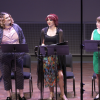
It’s often said that Claudio Monteverdi invented opera. Two operas were written before his, but two of his operas are among the earliest still regularly performed. One is the somber, heartbreaking L’Orfeo from 1607. The other, L’incoronazione di Poppea (The coronation of Poppea), is from almost four decades later. It premiered in 1643, the last year of Monteverdi’s long life. By then, the genre he defined had already become big business, especially during Carnival season in Venice.
The plot is loosely drawn from Roman history, as the emperor Nero (Nerone in Italian) dumps his queen in order to marry and crown his lover Poppea. The opera is loaded with threats and counterthreats, violence and betrayal. In a swirl of complications, a host of predatory characters behave badly with no apparent moral compunctions (sound familiar?). Perplexingly, or annoyingly, the worst of them — Nerone and Poppea — come out on top at the end.
Monteverdi’s exuberant but daunting masterpiece saw light once more in this summer’s offerings from West Edge Opera, in a production that was musically satisfying but lacking in dramatic coherence and overall emotional punch.

As with much early opera, Poppea’s music is expressive and at the same time austere — one or occasionally two voices accompanied only by a single line of music for the bass instruments. That format allows for expressive freedom but lacks the built-in drama of later opera scores with their big orchestras, extended arias, and predictable climaxes. Early operas need careful and detailed attention from both musical and stage directors.
In West Edge’s performance on Sunday, July 30, the music had fine moments but was hampered in Oakland’s cavernous Scottish Rite Center, which does not acoustically or visually support its singers and instrumentalists. The stage action took place at a considerable distance from the small orchestra (led from the keyboard by Adam Pearl), and the musical connection between singers and orchestra was often tenuous and uncertain.
Poppea was sung by soprano Shawnette Sulker, whose supple coloratura voice brought out the complexity of her character — both tender and scheming, generous and predatory — but who lacked the vocal power to carry consistently through the big hall. Mezzo-soprano Sarah Coit sang the part of Nerone, delivering the mentally unstable emperor’s thin veneer of power in his gloating songs of triumph over his perceived enemies. Nerone’s love scenes with Poppea were vocally pleasing and often remarkably tender, especially the couple’s final duet, “Pur ti miro” (I gaze at you).

Contralto Sara Couden powerfully expressed the anguish of Ottavia, Nerone’s current empress, eventually exiled from Rome after plotting Poppea’s assassination. San Francisco Opera regular Philip Skinner brought his dignified voice to the role of Seneca, the philosopher who dares to resist Nerone and dies for it. A comic role collating several nurse/busybody figures was winningly sung in drag by SF Lamplighters regular Samuel Faustine. Recent SF Conservatory of Music graduate Rayna Mia Campbell sparkled in the character of Drusilla with a nimble, clear soprano, especially in scenes with her lover Ottone, gracefully sung by countertenor Michael Skarke.
The stage direction by NJ Agwuna was haphazard. Though the action seemed designed to develop the connections between Roman lust and power and our contemporary world, it too often ended up feeling flat or forced. The two central lovers did not show a lot of chemistry; their interactions were stiff, even in what should have been moving love scenes. The opening number, in a hot tub, with the two actors in bodysuits, was especially awkward.
Nina Ball’s stage set, with intruding faux-marble columns flanked by perilously narrow steps, impeded the actors more than helped them. Images of tabloid stories about the emperor’s scandals were projected at the back of the stage but were rendered partially unreadable by columns and curtains. Supernumeraries playing the crowd scenes seemed under-rehearsed.
With such a complex plot in old Italian, clear English supertitles are crucial, but even here there was a lack of attention, although the director herself prepared them. Errors of spelling were compounded by overcomplicated diction and inconsistencies of action. One character suddenly spotted what he said were Nerone’s guards, but there were no guards onstage; Nerone longingly sang, “If only I were in your arms again,” all the while embracing Poppea. The festival program mistakenly listed the opera as the work of Handel while also omitting reference to the librettist, Giovanni Francesco Busenello.
Poppea can be a moving work, still relevant after nearly 400 years, but it felt as if West Edge tried too hard for that relevance — and at the same time, not quite hard enough. The company’s production runs for one more performance, Aug. 3.




